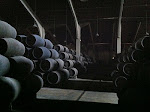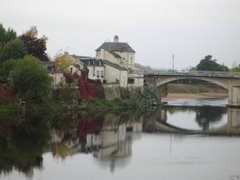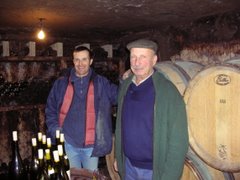Friday Night Bubbles

There are a few things, though, that I could not find anywhere on their website, things that I think are important when trying to understand a particular Champagne producer's philosophy. De Meric does not seem to grow their own grapes. I say "seem" because there is no definite answer on their website. It is clear that they purchase plenty of grapes, but do they also farm their own vineyards? Located in Pinot country in the Grand Cru village of Aÿ, De Meric purchases grapes from producers in many villages, some also known for Pinot Noir, and others in the Côte des Blancs, where Chardonnay is king. Although their wines are mostly Pinot Noir, the exact blends are not given.
And what of the wine making? Forgive me if I sound skeptical, but when a producer trumpets their strict adherence to tradition, I expect them to unveil the techniques used to make the wine. Natural or industrial yeasts, or both, for example? Time on the lees? Disgorgement dates? These are things that I want to know as I drink more and understand more about Champagne.
"Okay," you're thinking, "but how is the wine?" It was quite good, although in the end, I thought it was a bit unbalanced. I found this wine to be lively and energetic with an airy nose of biscuits and a rounded honeyed edge. A little air brings out a nice salty mineral quality to the nose. The
If I sound down on this wine, I don't mean to - I liked it and I would enjoy trying De Meric's other wines (although they are impossible to find here in NYC). I'm developing a better sense, though, of what to expect from Champagne at certain price points. At $37 this is not the high end of grower NV Bruts these days, but this bottle was not as impressive to me as other similarly priced red grape-heavy blends, such as those by Geoffroy, Fleury, Lallement, or Moutard.







4 comments:
If I recall correctly, Zachy's had the initial exclusive on DeMeric when Daniel Ginsberg (I think a former Advertising Exec who lives in California... who, incidentally is a big political supporter of Louisiana's Mary Landrieu) bought the brand. They then dropped it when the began importing the Champagne et Villages wines. It can be found a Beacon & Appellation in Manhattan and a few places up in Westchester like Suburban. I think it is only in CA, CT, NY, & NJ.
De Meric produces negociant bottlings. They have long-term contracts with their growers, but do not grow any fruit of their own, which makes sense as it is a house owned by outsiders to Champagne (including American Dan Ginsburg, as mentioned in the comment above) as well as German and French champagne fans.
Here is the blend for the bottling you tasted:
80% pinot noir from Ay, Mareuil-Sur-Ay and Mutigny
15% chardonnay from Cramant, Avize and Oger,
5% meunier from Cumieres.
thanks for these comments fellas. any comments on the wine (or the others in the De Meric portfolio)? Do you like them?
It is great to read comments from champagne lovers like yourselves. Joe is correct on the blend, and the grapes come from a small group of excellent growers who are friends. The winemaking methods used are modeled on Rene Collard, in my opinion the finest of all champagne producers -- no malo-lactic fermentation, no cold filtrationion, no sterile filtration, 50%+ fermented and aged in French oak (average age 10 years, which is why the wood isn't dominant). Wines are distributed in new York by Willette Wines.
Dan Ginsburg
Post a Comment